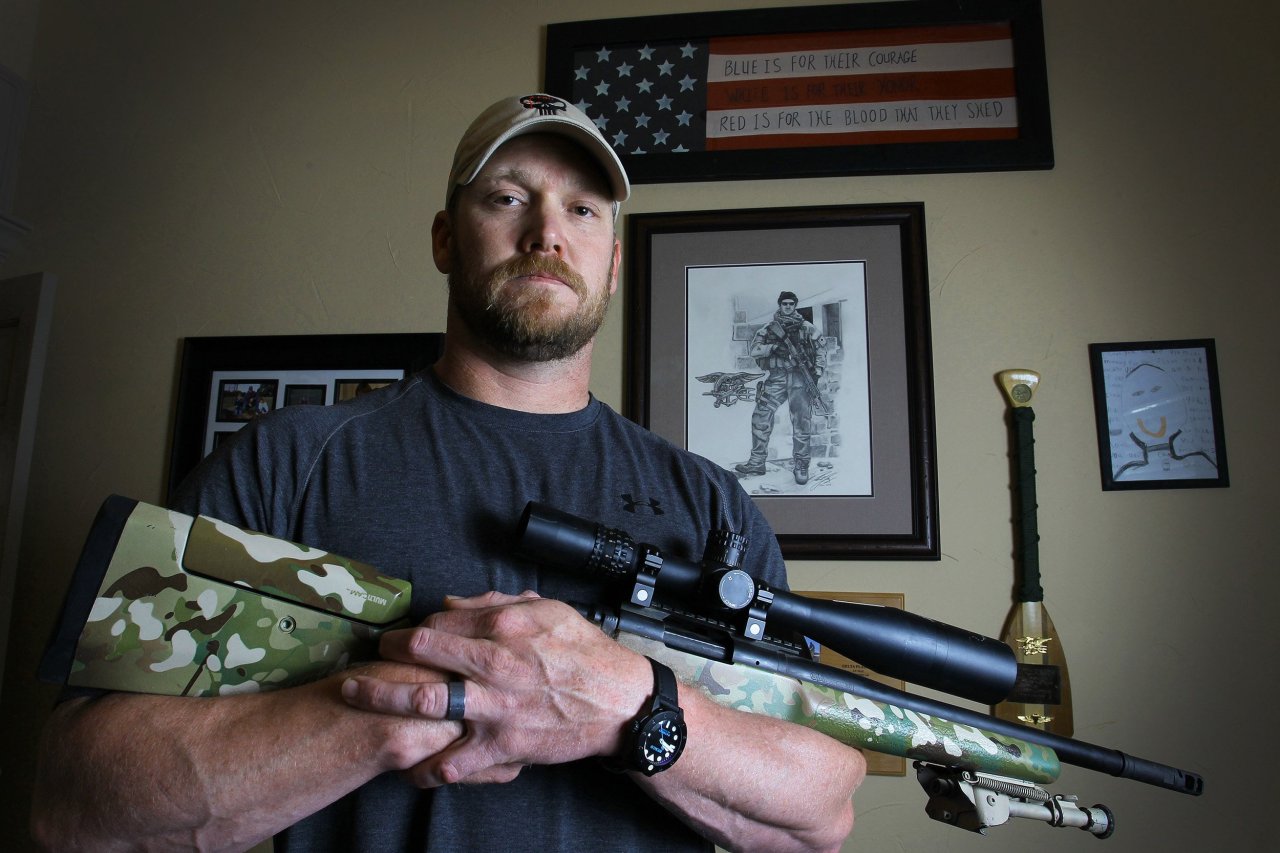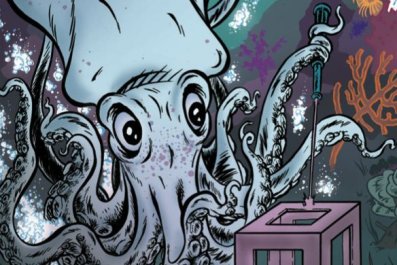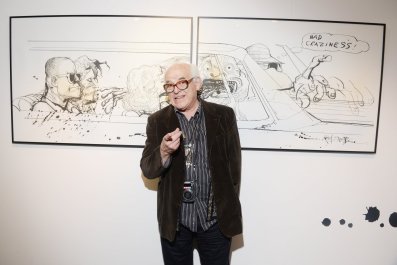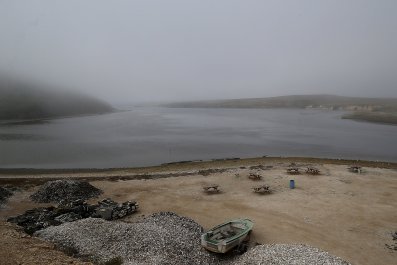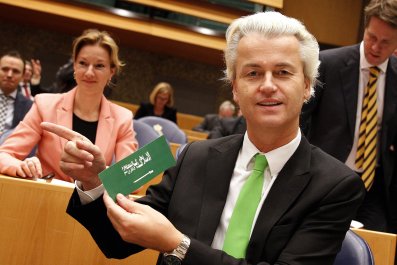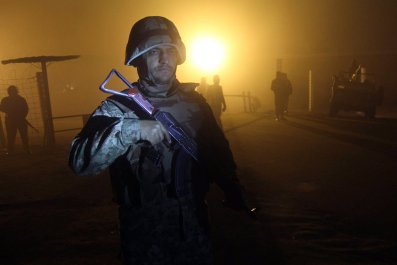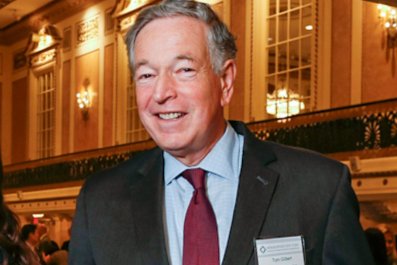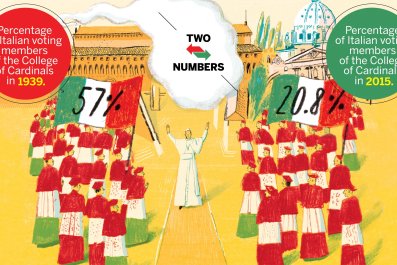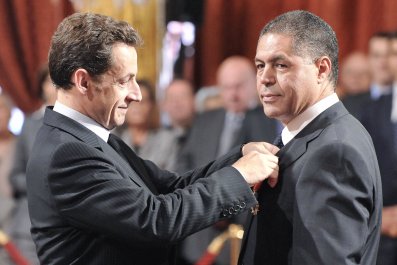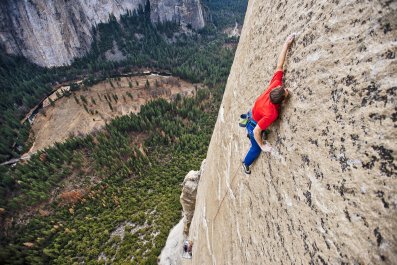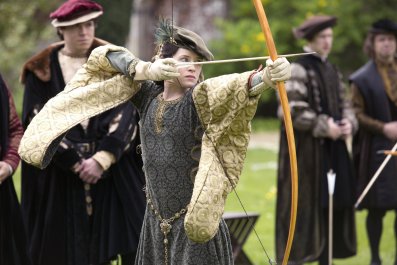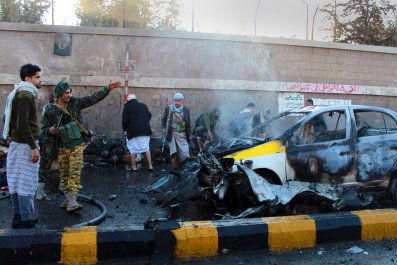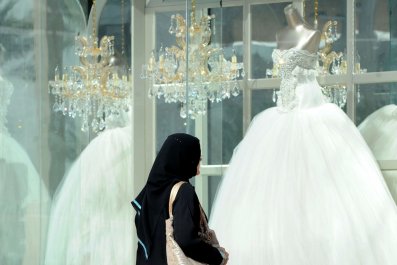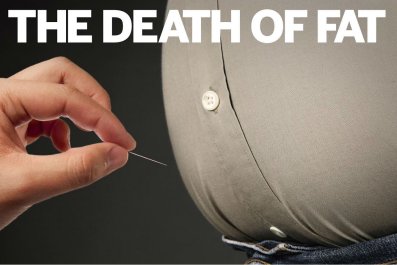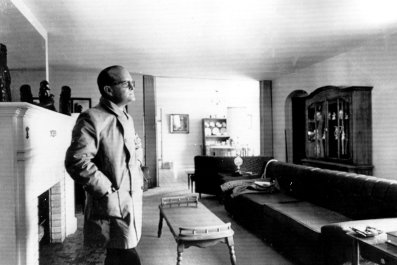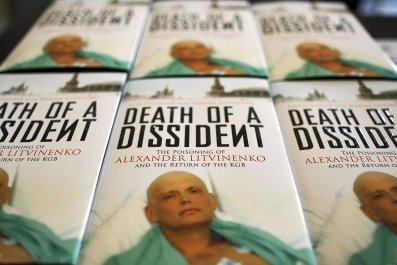"I always seemed more vulnerable at home," wrote Chris Kyle in his 2012 book, American Sniper: The Autobiography of the Most Lethal Sniper in U.S. Military History, which has sold an estimated 1.6 million copies and has been made into a Clint Eastwood film that opened December 25. "Overseas, on deployment, in the war, I seemed invincible," Kyle wrote. But then some minor injury, like a broken toe, would befall him back home. "You take your superhero cape off every time you come home from deployment," Taya Kyle told her husband.
She was right. Kyle was not felled in Nasiriyah, Fallujah or Sadr City. It wasn't a roadside bomb that got him, nor an insurgent sniper. Chris Kyle was killed on February 2, 2013, by Eddie Ray Routh, a deeply disturbed Marine who was one of the veterans Kyle had dedicated himself to helping. He had taken Routh shooting at Rough Creek Lodge, outside of Dallas, because Kyle thought that men who shot guns in Iraq and Afghanistan might want to keep shooting guns in Texas. He was right, too right. Routh shot Kyle and another man, Chad Littlefield, thus leaving Taya Kyle alone with two young children and proving Chris Kyle's premonition about his stateside vulnerability tragically correct.
Much of Eastwood's film takes place on the battlefield: We see the world reduced to the crosshairs of a scope, all moral quandaries compressed into the question of whether to squeeze the trigger. Lying prone on a rooftop, as he almost always is, Kyle pleads in a whisper for a boy not yet old enough to shave to drop the grenade launcher of a dead insurgent. If he keeps the weapon, he is an enemy and must be killed. "I don't see too much gray," Kyle wrote in his book, which opens with him killing a woman determined to lob a Chinese grenade at a unit of approaching Marines. After she's dead, Kyle concludes that the American lives he saved "were clearly worth more than that woman's twisted soul."
American Sniper—the book, but not the movie—often delves into this uncomfortable moral territory, making the fight in Iraq seem less like a military campaign than a religious crusade. "Savage, despicable evil. That's what we were fighting in Iraq," writes the man insurgents branded Shaitan ar-Ramadi (the Devil of Ramadi). His pronouncement certainly sounds messianic. Yet many in the Bush administration felt exactly the same way.
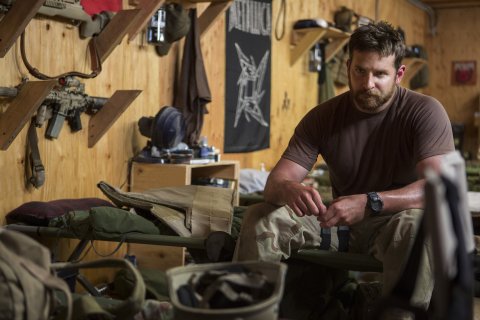
Timothy Murphy climbed a tree and positioned his rifle. Three hundred yards away was Brigadier General Simon Fraser, and Murphy had been ordered to kill him. Murphy did not hit Fraser with his first shot, nor with his second. But the marksman from Pennsylvania fatally wounded Fraser with a third shot, and he died the next morning.
This scene took place on October 7, 1777, during the Second Battle of Saratoga, of the Revolutionary War. The fight was won by the Americans and became a foundational stone in the legend of "Sure Shot Tim," whom Andy Dougan calls "a precursor of the modern sniper" in Through the Crosshairs: A History of Snipers. Murphy was "a man who uses his deadly skill as a marksman to target opposing commanders and shatter the morale of the enemy."
The 1st United States Sharp Shooters were formed during the Civil War, by Colonel Hiram Berdan. "We have no drill or picket duty," he advertised. "Our warfare is like the guerilla or indian.... You are privileged to lay upon the ground while shooting, picking your position. No commander while firing." By the end of September 1861, he had 1,392 men under his command, as well as permission to form a second regiment.
The mythic image of the sniper proffered by Berdan has endured. He is a soloist, a minimalist, a brooding freelance killer who lurks in the shadowy edges of the chaotic fray. During the Vietnam War, where the irregular terrain made traditional warfare obsolete, snipers were seen as having a tactical advantage over regular infantry. "You don't select the first gooner that comes into your field of fire," counseled Captain Jim Land, who trained snipers in Hawaii. "I know that as grunts it was easy for you to feel justified in killing the enemy when he attacked you—he was trying to kill you.… As a sniper you do not have that luxury. You will be killing the enemy when he is unaware of your presence.... You will be, in a sense, committing murder on him—premeditated."
The military historian Adrian Gilbert once called the sniper "the ultimate hunter in a game where the quarry shoots back," a description that would have surely appealed to Kyle. The product of north-central Texas, Kyle wrote that he "always loved guns, always loved hunting." He got into fights at school, though he claims he "didn't start most of them." After high school, he dipped in and out of college, then worked as a ranch hand. In 1999, he did what he had long wanted to do and enlisted in the Navy, eventually becoming a member of a SEAL team. He makes no pretense of being the best marksman in his class. Yet he was good enough to become, in time, a sniper.
Jeremy A. Mitchell, who served as an Army sniper in Afghanistan's treacherous Kunar province, told me that being a sniper was a "coveted position." But it was also a difficult one, he recalls. "You lay in the same place for days," watching for enemy movements. Mitchell would go for weeks without showering or changing. "Out in the elements the whole time," he recalls. "You just get fatigued."
The genius of the Chris Kyle story is that it imbued warfare with a kind of glamorous sheen, turning the privations Mitchell describes into the stuff of macho American legend. His book is clearly written for a generation reared on PlayStation, Red Bull and Vin Diesel flicks. "Fuck, I thought to myself, this is great," he wrote. "I fucking love this. It's nerve-wracking and exciting and I fucking love it." He was good at it, too, with 160 kills to his name. Yet it is hard to imagine a similar sentiment from a dogface who'd liberated Buchenwald, or from a grunt who'd spent a miserable year wading through the bloody rice paddies of Da Nang.
Brian Van Reet, a veteran who served in Iraq, has accused Kyle and others of promulgating the "kill memoir" genre, in which the horrors of war are treated with a sunny, uncomplicated, Rumsfeldian braggadocio. Authors like Kyle, he wrote in The New York Times, "[offer] the spectacle of high body counts and terrorists twitching on the floor as proof that we are winning. Or if not that exactly, then proof we have inflicted serious damage." Van Reet, who is now a writer, read American Sniper but has not yet seen the movie. He told me that he thought Kyle was "an embellisher" and that the movie based on his memoir is for "people who like Toby Keith," the gratingly patriotic country singer.
I do not like Toby Keith songs, or for that matter, any country music except that one song by Garth Brooks about having friends in low places. Nevertheless, there is much to admire about the movie Eastwood has made.
The film version of Chris Kyle, for starters, is far more likable than the one in the book, even if the latter is more faithful to life. Bradley Cooper, who plays Kyle, could make just about anyone seem like the kind of guy you'd want for a brother-in-law. He captures Kyle's bravado, at once alluring and threatening, but endows the character with depth. It's almost something like naïveté, a likable aw-shucks-I'm-just-a-Texas-boy-doing-my-job quality. Sienna Miller is also excellent, as the devoted but brassy Taya Kyle, though she is underused.
The battle scenes are poems of dust and blood. Eastwood has made a great combat movie; a great war movie, however, would have needed more of Kyle at home, trying to find a purpose in the civilian world, struggling with alcohol, feeling holy matrimony slip from his grasp. While on leave, he is startled at the sound of a lawnmower. In that moment, Cooper capably broadcasts the inner anguish of his character, the bad juju he brought back from the ghoulish theater of war; Eastwood could have done more with that flash of pain. And with Routh, too, whom we see only in the final sequence of the film. Kyle's death is treated almost like an afterthought, though the credit sequence, which shows actual footage from his funeral procession through Texas, is so moving because it is so real.
Perhaps what makes some uncomfortable about Kyle is that he reminds us of who fights our wars. "You live in a dreamworld," he once told an interviewer. The implication was that he, Kyle, didn't. Eastwood forces us to leave that snug dreamworld for about two hours, but while still stuffing our faces with popcorn and soda. Then we can go back to our lives, without ever having to think again about Muqtada al-Sadr.
"It's not even on the news," Kyle complains to Taya during a spell back home. "No one cares." This must have been a dismaying thought for someone who felt the cosmic import of what he was doing. Even those soldiers who didn't share Kyle's religious vision of the conflict felt keenly the apathy back home. There was "no attempt by the government to call for some national sacrifice," Van Reet told me. "Besides asking people to go out and shop more, there was no effort."
Invariably, both the right and left will use American Sniper, though the movie is far less susceptible to political manipulations than the book on which it is based. But when has that stopped anyone? Already, a writer for the liberal Guardian has written a piece labeling Kyle a "hate-filled killer," while a critic for the right-leaning New York Post praised the Navy SEALs depicted therein as "a class of men in whom is contained a distilled essence of the American spirit."
Some will surely go see the movie because they are fans of Chris Kyle and what he represents, the cowboy machismo of the Texas plains. And others will avoid it for much the same reason. But both blind devotion and wholesale rejection miss the point. The wars are yours, whether you love them or not.



